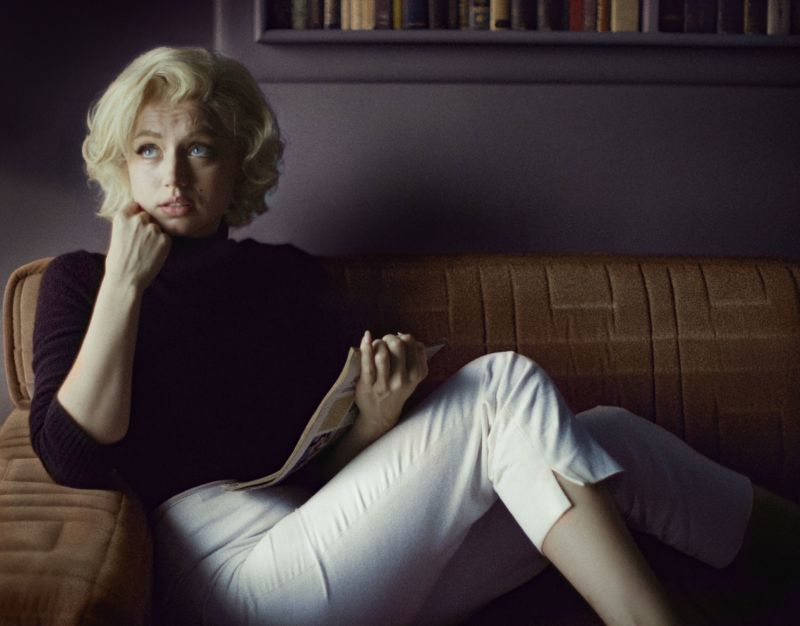
The gap between a star performance and the movie containing it has seldom been wider than in “Blonde,” which features Ana de Armas stunningly capturing the look and essence of Marilyn Monroe in the service of a film that’s pretentious, heavy handed and lengthy to the point of exhaustion. Netflix will surely get its money’s worth attention-wise thanks in part to its restrictive NC-17 rating, but the film’s merits burn out long before its credits ever roll.
Adapted from Joyce Carol Oates’ novel about the Hollywood icon by writer-director Andrew Dominik (“The Assassination of Jesse James by the Coward Robert Ford”), the movie works from the premise that not only did the frozen-in-time star suffer because of the men around her, but also the society (that is, us) that leered at her even in the pre-Internet age. It’s not a fresh take or a wrong one, but the tone is so self-conscious and surreal as to blunt those insights.
Blurring fact and fiction, “Blonde” begins with the very young Norma Jeane and her relationship with the mentally disturbed mother (Julianne Nicholson) who was forced to give her up, returning time and again to the idea that the she never stopped pining for the father she didn’t know, while seeking to replace him with the famous men who wooed, wedded and exploited her.
Norma Jeane is eventually transformed into Marilyn Monroe, but even then she consistently speaks of her star persona in the third person, as if the image stands apart and utterly separate from the human being behind it.
The irony is that as much as the New Zealand-born director labors to humanize Marilyn – after numerous movies based on her life, including several for television – this version fares best in depicting the familiar image through replicating scenes from her films. De Armas and the staggering hair/makeup/costume work present those moments so uncannily (occasionally mixed with footage of Monroe’s co-stars) that you have to blink to make sure it’s not the real thing.
Beyond that, the film gruelingly drags on through unhappy interludes of the actress being used and abused, oscillating between color and black-and-white imagery in a way that feels arbitrary. Dominik also distastefully deals with Monroe’s lost pregnancies by peeking at the fetus inside her, which becomes symbolic of just how overdone much of the movie is.
Those excesses can’t entirely eclipse the fearless and vulnerable nature of de Armas’ portrayal, and she’s probably right in contending that the NC-17 rating (a guidance suggesting only adults be admitted to theaters) is undeserved, given similarly edgy fare that hasn’t received it. Then again, the label seems on surer footing contemplating the film’s overall grimness than its sexuality.
Several supporting roles are also impressive, with Bobby Cannavale and Adrien Brody as Monroe’s husbands Joe DiMaggio (again shown grimacing through “The Seven Year Itch” shoot) and playwright Arthur Miller, respectively.
Still, “Blonde” is almost wholly de Armas’ show, and to the extent it’s worth sitting through at all give her every ounce of credit. When she tells DiMaggio, “I’ve been happy all my life” in Monroe’s honeyed voice, the lie is as unconvincing as it is heartbreaking.
Netflix is providing the movie the now-customary brief theatrical run after making its debut at the Venice Film Festival, but homes are surely where it’s most apt to be watched, especially given its 2 hour, 46 minute running time.
In a private setting, viewers will be able to take all the breaks they need to weather the experience, but they won’t be able to escape the film’s relentlessly lurid, in-your-face approach. Indeed, once you get past admiring de Armas’ immersion into the role, that’s the only itch that “Blonde” seems to know how to scratch.
“Blonde” premieres September 16 in select US theaters and September 28 on Netflix. It’s rated NC-17.
